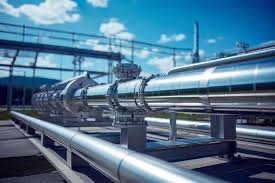In its latest initiative to replace the Maghreb-Europe (GME) energy supply, Morocco is engaged in discussions with Nigeria to advance the African-Atlantic Gas pipeline project in Rabat. The project aims to fill the void left by Algeria’s cancellation, prompted by diplomatic rivalry.
“Morocco’s King Mohammed VI invited Nigerian President Bola Ahmed Adekunle Tinubu to visit Morocco during a phone exchange during which the two leaders discussed the African-Atlantic Gas Pipeline,” said a royal statement.
Initiated in 2016 first by King Mohammed VI and former president of Nigeria Muhammadu Buhari, the Nigeria-Morocco Gas Pipeline, which would skirt the coastlines of 13 West African countries, could pump billions of cubic metres of natural gas to the kingdom.
OPEC member Nigeria has the largest proven reserves of gas in Africa and the seventh largest globally.
Morocco is set to host over 1600 kilometres of the project, which is 5,600 kilometres long.
Both countries have moved to revive long-stalled projects in light of a gas supply crunch following Russia’s invasion of Ukraine in 2021. Last November, the Moroccan monarch stressed the potential benefits that the pipeline could bring to Africa and Europe, which were heavily reliant on Russian gas and were still grappling to find new sources.
The project became crucial since Algeria cancelled the Maghreb-Europe gas pipeline (GME) over its diplomatic brawl with Rabat.
GME connected Algerian gas fields with the port of Tarifa in Cadiz via Morocco, earning the Moroccan government over 50 million euros annually in transit fees and 800 million cubic metres of Algerian gas at a stable price, which was used to power their stations.
After Algiers cut off its supply, Rabat turned to different energy sources. It also started looking to secure a gas deal that does not require passing by the borders of its frenemy and neighbour, Algiers.
With less than 100 million cubic metres of natural gas production annually, the Moroccan kingdom mainly depends on Algerian natural gas to meet its needs.
Morocco and Nigeria’s new gas pipeline does not need Algier’s collaboration; however, bringing together 13 countries on a politically unstable continent is the obstacle Rabat might face.
Last year, a report by Bne, a business media outlet, suggested that the recent coup in Niger could sabotage Morocco’s project because of the coup leaders’ “pro-Russia policy.”
So far, only seven of the 13 countries in question have signed MoUs with Rabat. Morocco is still in negotiations with the other states. The pipeline is set to cost US$25 billion. The UAE promised last December to contribute to financing the project.
Meanwhile, Algeria is also pursuing its own similarly challenging pipeline.
Since the Ukraine-Russia war, Algeria has pushed to relaunch plans for a trans-Saharan gas pipeline linking Nigeria to Algeria’s Mediterranean coast via Niger.
In 2022, Algiers signed a MoU with Abuja and Niamey to bring the 4,128-kilometre pipeline to fruition for up to US$19 billion. A start year has yet to be set.
From Algeria, the gas could be pumped via the Mediterranean undersea Transmed pipeline to Italy through Tunisian territory or loaded onto liquefied natural gas tankers for export.

